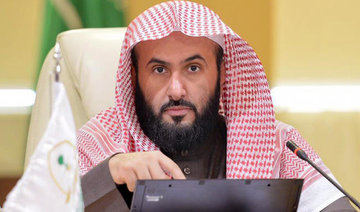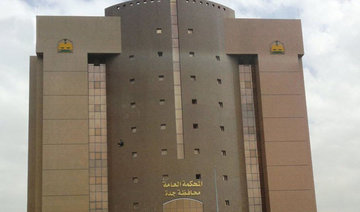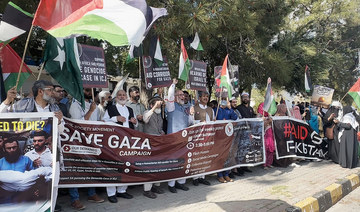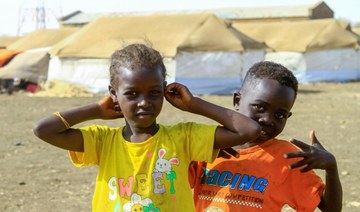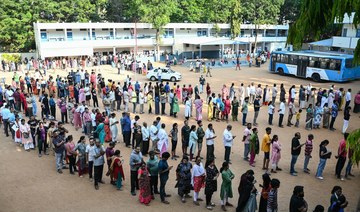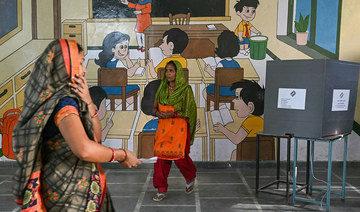JEDDAH: Saudi female lawyers welcomed the decision to open sections for women in courts, as they believe this move will facilitate procedures for women, especially in family and marital cases.
Minister of Justice Walid Al-Samaani approved the opening of new women’s sections in notary offices, and the creation of special areas to receive women to respect their privacy.
He also directed the quick preparation of trained female staff to work in women’s sections and notary offices to provide the necessary services with the required speed and accuracy.
Sawsan Al-Qadhi, a Saudi lawyer, believes that there is still a long way to go toward involving women in the Saudi judicial system. “This decision can be helpful in providing assistance for females and provide jobs for female graduates, but its ultimate impact is not enough for us as legal practitioners and lawyers,” she told Arab News.
She added: “It is not unusual for women to work in courts in Saudi Arabia; they have always been there, but mostly in charge of minor responsibilities like reconciliation, checking and guarding. I surely support opening up new fields of work for women, but I believe that women should have decision-making power just like men. We see young Saudi women working everywhere, but the working mechanism always depends on men.”
Asked about the future of women working in courts, she said that women may get the chance in the future to work as judicial assistants but they may not be able to get positions beyond that; it has to do with judicial law, which is known to be a complicated issue.
According to Abdul Aziz Al-Naser, an adviser to the minister of justice, women’s sections in notary offices in Riyadh, Makkah, Madinah, Jeddah and Dammam, will open soon.
Al-Naser said in an interview on Saudi TV that these jobs would be offered to Saudi females holding master’s degrees in different fields.
Women’s sections in notary offices to open soon
Women’s sections in notary offices to open soon

Sheffield United become first team relegated from EPL after heavy loss at Newcastle

- The Blades were 10 points from safety with three games remaining, ensuring an immediate return to the Championship
- Alexander Isak scored two of Newcastle’s goals, taking his season tally to 23 in all competitions
NEWCASTLE, England: Sheffield United became the first team to be relegated from the English Premier League after losing at Newcastle 5-1 on Saturday.
The Blades were 10 points from safety with three games remaining, ensuring an immediate return to the Championship.
They took the lead in the fifth minute at St. James’ Park through Anel Ahmedhodzic, only to be overwhelmed by a home team on the charge for European qualification.
Alexander Isak scored two of Newcastle’s goals, taking his season tally to 23 in all competitions — 19 in the league. That’s one behind joint leaders Cole Palmer of Chelsea and Erling Haaland of Manchester City.
Bruno Guimaraes and Callum Wilson also netted for Newcastle, while Ben Osborn scored an own-goal. That meant Sheffield United conceded 13 goals to Newcastle this season, following September’s 8-0 loss at Bramall Lane.
The visitors took the lead when they worked a short corner move for Ahmedhodzic to head Gustavo Hamer’s cross past Martin Dubravka.
Isak’s first goal came in the 26th after Jacob Murphy played the perfect ball into the Sweden striker, Isak, who ran in behind Auston Trusty and finished with aplomb.
Mason Holgate headed against the crossbar and Andre Brooks blazed wide from the resulting corner as Sheffield United threatened.
The second half was all Newcastle, which netted four goals in 18 minutes — starting in the 54th when Anthony Gordon curled a free kick to the far post where the unmarked Guimaraes dived to head home.
Isak coolly converted a 61st-minute penalty after Holgate bundled Gordon to the ground, and it was 4-1 within four minutes when Osborn back-heeled the ball into his own net as he tried to clear.
Foderingham denied Wilson within five minutes of his arrival but could not prevent him from making it 5-1 with a powerful finish after fellow substitute Harvey Barnes played him in.
Newcastle were in seventh place, one point Manchester United in sixth.
New Zealand win toss, opt to bowl in 5th and final T20 against Pakistan
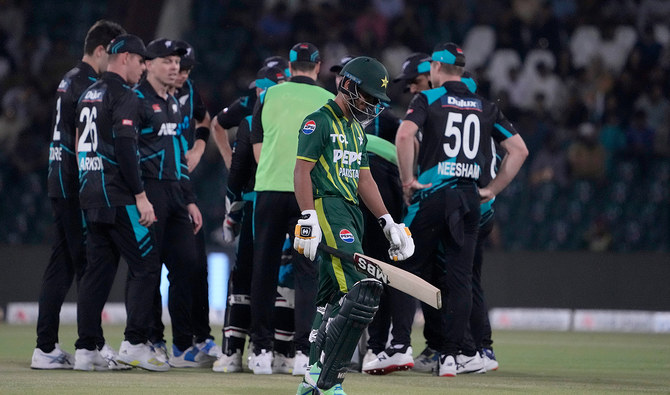
- Pakistan, looking to build-up for June’s T20 World Cup, are trailing 2-1 in the series
- Pakistan have brought in their ace fast bowler Shaheen Shah Afridi in place of Zaman Khan
LAHORE: New Zealand captain Michael Bracewell won the toss and elected to field in the fifth and final Twenty20 against Pakistan on Saturday.
Pakistan, looking to build-up for June’s T20 World Cup, are trailing 2-1 in the series as they tested their bench strength against the understrength Black Caps.
Pakistan made just one change from the team that lost the fourth match by four runs, bringing in their ace fast bowler Shaheen Shah Afridi in place of Zaman Khan.
New Zealand, touring Pakistan without their nine frontline T20 players who are in the Indian Premier League, made three changes.
Tim Seifert recovered from sore back and returns in place of Tim Robinson, who scored a half-century in the last game but was ruled out with a groin injury.
Cole McConchie and Zak Foulkes also made it to the playing XI replacing Dean Foxcroft and Jacob Duffy. Foxcroft was ruled out with a back injury.
The first game was abandoned because of rain before Pakistan bowled out New Zealand for 90 runs in the second game to win by seven wickets.
New Zealand made a comeback, winning the third match by seven wickets before edging out the home team in the last game at Qaddafi Stadium on Thursday.
Ships from Turkiye planning to deliver aid to Gaza were denied right to sail

- The Freedom Flotilla Coalition described the cancelation of the vessels’ registry as a “blatantly political move,” adding: “Without a flag, we cannot sail”
- The organizers blamed Israel for applying pressure to prevent the flotilla
ISTANBUL: A three-ship flotilla planning to reach Gaza with humanitarian aid from Turkiye was prevented from sailing by Guinea-Bissau authorities, which took down their country’s flags from two ships, organizers said.
Just before the flotilla was set to sail from Turkiye to Gaza on Friday with 5,000 tons of aid, a surprise inspection by the Guinea-Bissau International Ships Registry resulted in the removal of the flags from two of the Freedom Flotilla ships.
A press release by the Freedom Flotilla Coalition described the cancelation of the vessels’ registry as a “blatantly political move,” adding: “Without a flag, we cannot sail.”
The organizers blamed Israel for applying pressure to prevent the flotilla. “It is obvious, and I think it is publicly known, that there has been close contact between Israel and the president of Guinea-Bissau,” organizer and steering committee member Torstein Dahle told The Associated Press, without elaborating.
He said that hundreds of Turkish and international participants were disappointed by the cancelation. “It is very hard for us, because it takes time to procure a flag. It’s a procedure that can’t be done in a few days. ... But we’re not giving up.”
The Freedom Flotilla Coalition includes Turkish and international organizations, among them the IHH and the Mavi Marmara Association from Turkiye, which also organized an ill-fated 2010 flotilla.
On May 31, 2010, Israeli commandos stormed the Mavi Marmara in international waters, leading to an altercation that left nine people dead and dozens of activists wounded. On the Israeli side, seven soldiers were wounded by activists who attacked them with clubs, knives and pipes.
Pro-Palestine protester claims manhandling after disrupting German ambassador’s speech in Lahore
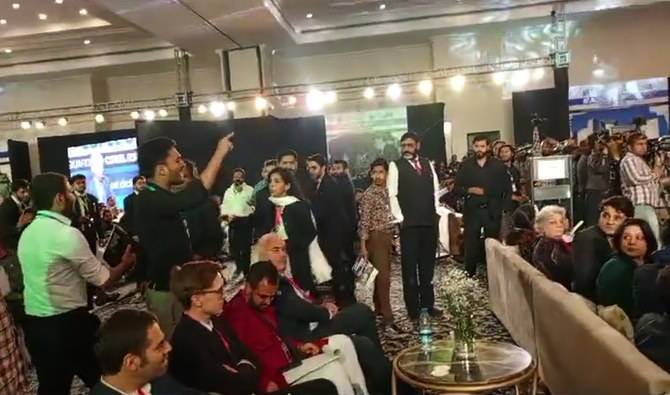
- The envoy was criticized for ‘lecturing’ on civil liberties when Germany was punishing defenders of Palestinian rights
- One of the organizers of Asma Jahangir Conference says no one should ‘insult people by shouting or getting harsh’
ISLAMABAD: A pro-Palestine protester in Pakistan, who interrupted German Ambassador Alfred Grannas during his speech on civil liberties in South Asia at a rights conference in the eastern city of Lahore on Saturday, said he was ‘manhandled’ by the organizers who later forces him out of the hall.
Ali Abdullah Khan, who studies economics and is part of the Progressive Students Collective, disrupted the German envoy’s speech at the popular Asma Jahangir Conference while accusing the European state of “brutally abusing” those who have been agitating for Palestinian rights.
Germany has clearly sided with Israel since the beginning of the war in Gaza after a surprise attack was launched by Hamas on Oct. 7 as a response to the deteriorating Palestinian condition living under Israeli occupation.
The conflict, which has led to the killing of over 34,000 Palestinians, has led to widespread criticism of the Israeli government, leading to protests in different parts of the world.
While countries like South Africa have accused the Jewish state of committing genocide in Gaza, German authorities have forcibly removed protest encampments and gone into people’s houses to arrest them for critical social media posts on charges of antisemitism.
“We were forced out of the place after we raised our voice during the German ambassador’s speech,” Khan said while speaking to Arab News. “The organizers manhandled us and banned our entry in the conference.”
He said it was “baffling” to see the German ambassador “lecturing” people on civil liberties in Pakistan after his country supplied arms and ammunition to Israeli military to kill Palestinian civilians and destroy hospitals and education institutions.
“Germany isn’t in a position to champion civil liberties and human rights when it is complicit in the killing of thousands of civilians in Palestine,” he continued. “We simply called out Germany’s hypocrisy by peacefully raising our voice in the conference that literally agitated the ambassador.”
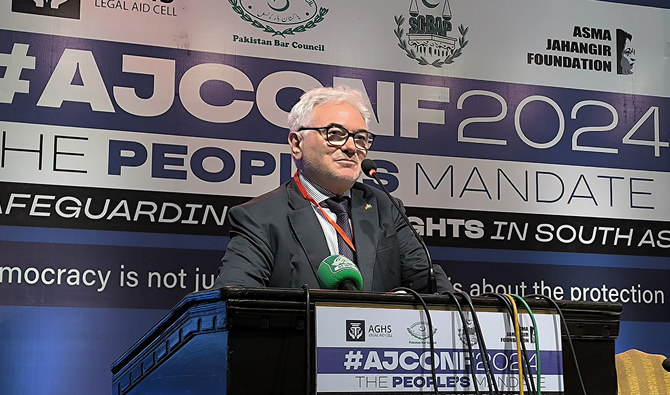
Khan said he had peacefully expressed solidarity with the people of Palestine and would continue to do so until the western world remained “complicit in the brutal massacre of Palestinians.”
The Asma Jahangir Conference is named after a late Pakistani human rights lawyer and activist and brings together scholars, activists, legal experts and policymakers to discuss a wide range of issues affecting the lives of marginalized communities.
Responding to an Arab News query, Munizae Jahangir, one of the conference’s organizers and the daughter of Asma Jahangir, objected to the way Khan criticized the German envoy.
“Freedom of speech is everybody’s right, but there should be a decent way to ask questions or express your difference of opinion,” she said. “The purpose of the conference is to provide a platform to people to express their opinions, views and dissent, but one should not insult people by shouting or getting harsh.”
Jahangir, a prominent journalist and activist in her own right, said a special session on Gaza was held at the conference to highlight the issue that was attended by Shawan Jabarin, director of the Palestinian human rights organization Al Haq, and Francesca Albanese, the United Nations Special Rapporteur on the Occupied Palestinian Territories.
“We warmly welcome the difference of opinion at our platform but not the insult and disrespect to our honorable guests,” she added.
Earlier, Khan interrupted the German ambassador shortly after he began his speech.
“I am shocked by the audacity that you are here to talk about civil rights while your country is brutally abusing the people speaking for the rights of the Palestinians,” he shouted while standing at the back of hall.
Many people around him supported him by shouting “Free, Free Palestine” and “From the River to the Sea.”
The German envoy, who looked visibly perturbed by the development, responded by shouting back at him and pointing to the exit.
“If you, if you want to shout, go out,” he said. “There you can shout. Because shouting is not a discussion.”
Last year in November, a Pakistani classical dancer and human rights activist Sheema Kermani raised slogans for a ceasefire at a British Deputy High Commission event in Karachi and later complained of being “escorted out.”
Voter turnout slumps, Modi ‘wave’ missing from India’s 2024 polls
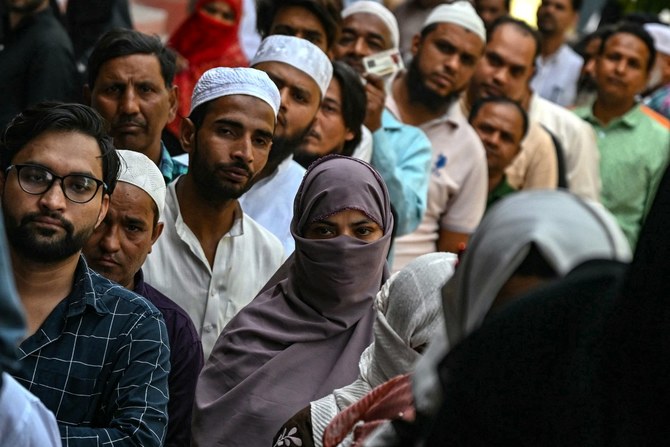
- India’s general election started on April 19 and is taking place in seven phases till June 1
- Voters are battling extreme temperatures as parts of India gripped by heatwave
NEW DELHI: Voter numbers have slumped in the first and second phase of India’s general election, with experts saying that the “wave” of enthusiasm that brought incumbent Prime Minister Narendra Modi to power in 2014 was no longer present in the ongoing polls.
More than 968 million people have been registered to vote in the world’s biggest general election, in which Modi and his Hindu nationalist Bharatiya Janata Party are aiming for a rare third consecutive term in power.
The first phase of voting was on April 19 and the polls are taking place over six weeks, with results expected on June 4.
India has a total of 28 states and eight federally governed territories. Some regions complete the process on a single day, while others spread it out over several phases.
The second phase was on April 26 and the other voting dates will be May 7, May 13, May 20, May 25 and June 1.
Friday’s turnout was estimated by the Election Commission of India at 61 percent — compared with 68 percent in the second phase five years ago. In the first phase, it was 65 percent against nearly 70 percent in 2019.
The lower turnout showed “apathy toward politics,” D. Dhanuraj, chairman of the Kerala-based Center for Public Policy Research, told Arab News.
“I think it is clear now that there is no wave in favor of any party as such. In 2014, there was a wave, in 2019 there was a wave,” he said, referring to the enthusiastic pro-Modi balloting in the past two general elections.
“(In) 2024, there was a talk that there was a wave, but I think it is becoming clear that there is no such wave, no wave that would give exponential majority in the parliament to any party.”
Modi and his BJP-led National Democratic Alliance are challenged by an alliance of two dozen opposition parties — the Indian National Developmental Inclusive Alliance, or INDIA — led by the Congress party, which has ruled the country for close to 45 years since independence in 1947.
Congress plunged to a historic low when it was swept out of power by the BJP in the 2014 and 2019 general vote, and won its second-lowest number of 52 seats in 2019, when Modi’s party enjoyed a landslide victory, winning 303 out of 543 seats in the lower house of parliament.
The party or coalition that wins at least 272 parliamentary seats forms the government.
In 2024, Modi has been aiming for 400 seats for the National Democratic Alliance led by his BJP. But the target, often cited ahead of the first phase, has not been repeated.
Although pre-poll surveys suggested Modi would easily win, it is no longer projected to be a landslide as in in the two previous elections.
“It was the electoral rhetoric of the BJP to cross 400 seats, but this reality is not happening, it seems now,” Satish Kumar Singh, political analyst in Delhi, told Arab News.
“The BJP gave that slogan just to galvanize voters. When there is less voting that also means that the BJP might not have a whopping majority, it might be close to a simple majority.”
Another factor deterring voters from standing in long queues at polling stations was the hotter-than-normal summer, with temperatures in some states on Friday exceeding 40 degrees Celsius.
“There is no wave but heatwave in this election,” Singh said. “That is keeping the voters away from the polling booths.”
Not all experts expected the lower turnout to affect the ruling party’s chances in the polls.
“There seems to me no empirical evidence that if voter turnout increases it supports any side — the ruling (party) or the opposition,” said Sandeep Shashtry, political analyst and vice-chancellor of Jagran Lakecity University in Bhopal.
“I think we cannot make a generalization about the wider implications.”


